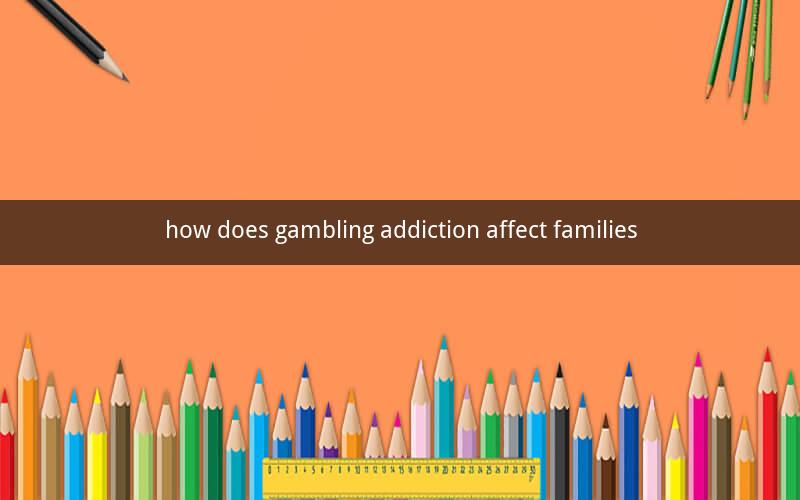
Table of Contents
1. Introduction to Gambling Addiction
2. The Psychological Impact on Families
3. Financial Consequences for Families
4. Emotional and Social Ramifications
5. Legal and Ethical Issues
6. Support and Resources for Families
7. Case Studies and Real-Life Examples
8. Prevention and Intervention Strategies
9. The Role of Society and Policy
10. Conclusion
1. Introduction to Gambling Addiction
Gambling addiction, often referred to as compulsive gambling or problem gambling, is a condition characterized by an irresistible urge to gamble despite harmful negative consequences. This addiction affects not only the individual but also their entire family unit. Understanding how gambling addiction impacts families is crucial for developing effective support systems and interventions.
2. The Psychological Impact on Families
The psychological impact of gambling addiction on families is profound. Family members may experience feelings of guilt, shame, and embarrassment. They often internalize the problem, believing that they could have prevented the addiction or that they are somehow responsible for the gambler's behavior. This can lead to increased stress, anxiety, and depression within the family.
3. Financial Consequences for Families
One of the most immediate and severe impacts of gambling addiction is the financial burden it places on families. The gambler may accumulate substantial debt, leading to missed payments, eviction, and even foreclosure. This financial strain can cause significant distress and conflict within the family, further exacerbating the psychological toll.
4. Emotional and Social Ramifications
Gambling addiction can disrupt the emotional and social fabric of a family. Children may suffer from emotional and behavioral issues, such as anxiety, depression, and aggression. Relationships may become strained, with family members feeling isolated and unsupported. Social isolation is also common, as the addicted individual may withdraw from friends and family to pursue gambling activities.
5. Legal and Ethical Issues
Gambling addiction raises legal and ethical issues for families. The addicted individual may face legal consequences, such as arrest or imprisonment, due to illegal gambling activities. Additionally, family members may need to navigate complex ethical dilemmas, such as whether to report the gambler's actions to authorities or support them through the legal process.
6. Support and Resources for Families
Support and resources are essential for families affected by gambling addiction. There are various organizations and support groups available to provide guidance and assistance. These resources can help families understand the addiction, develop coping strategies, and seek professional help.
7. Case Studies and Real-Life Examples
Real-life examples and case studies illustrate the devastating impact of gambling addiction on families. These stories highlight the challenges faced by family members and the resilience required to overcome the addiction.
8. Prevention and Intervention Strategies
Prevention and intervention strategies are crucial in addressing gambling addiction. Education and awareness campaigns can help identify risk factors and promote responsible gambling. For those already affected, interventions may include therapy, counseling, and support groups.
9. The Role of Society and Policy
Society and policy play a significant role in addressing gambling addiction. Governments can implement regulations to protect vulnerable populations and provide resources for those affected by addiction. Additionally, society can promote a culture of support and understanding to reduce the stigma associated with gambling addiction.
10. Conclusion
Gambling addiction has far-reaching consequences for families, affecting their psychological, financial, and social well-being. By understanding the impact of this addiction, families can seek support, develop coping strategies, and work towards recovery. Society must also play a role in providing resources and fostering a supportive environment for those affected by gambling addiction.
Questions and Answers
1. Q: How can family members recognize the signs of gambling addiction in a loved one?
A: Signs include secretive behavior, financial strain, neglect of responsibilities, and an increase in time spent gambling.
2. Q: What are the long-term effects of gambling addiction on children?
A: Long-term effects may include emotional and behavioral issues, academic difficulties, and substance abuse.
3. Q: Can gambling addiction be treated effectively?
A: Yes, treatment can be effective, often involving therapy, counseling, and support groups.
4. Q: How can families cope with the financial consequences of gambling addiction?
A: Families can seek financial counseling, negotiate with creditors, and develop a budget to manage expenses.
5. Q: Are there any legal protections for families affected by gambling addiction?
A: Some jurisdictions offer legal protections, such as bankruptcy laws that can help families manage debt.
6. Q: How can family members support a loved one in recovery from gambling addiction?
A: Support involves understanding the addiction, maintaining open communication, and encouraging participation in support groups.
7. Q: What role does social support play in the recovery process for families affected by gambling addiction?
A: Social support can provide emotional stability, practical assistance, and a sense of community during the recovery process.
8. Q: How can schools help students develop responsible gambling habits?
A: Schools can offer education programs on gambling, teach financial literacy, and promote healthy coping mechanisms.
9. Q: What can governments do to prevent gambling addiction?
A: Governments can regulate gambling activities, enforce age restrictions, and provide resources for those affected by addiction.
10. Q: How can society reduce the stigma associated with gambling addiction?
A: Society can promote awareness, offer support, and encourage open dialogue about the addiction to reduce stigma and foster understanding.